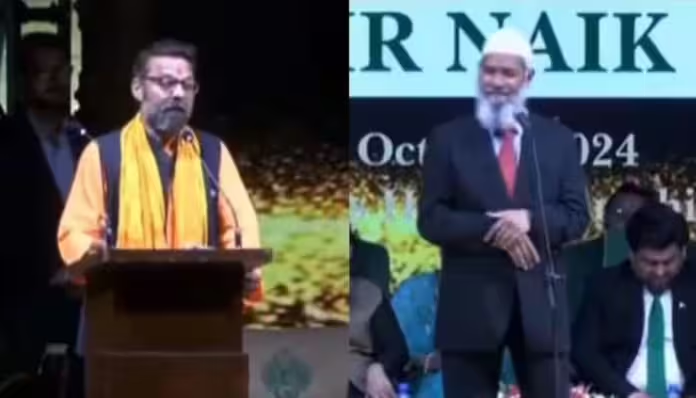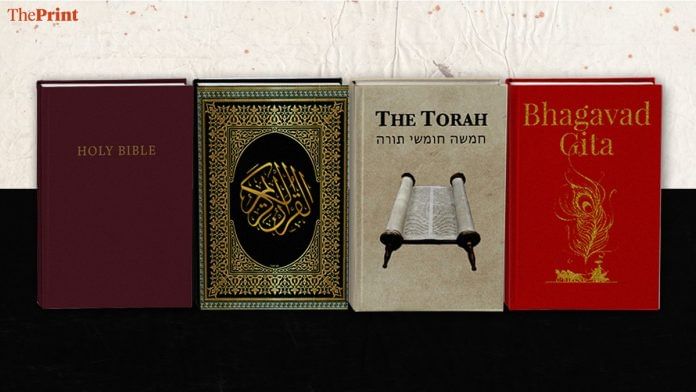
Hindu Scholar Quotes Gita in a recent heated debate with Zakir Naik in Pakistan, questioning the Islamic preacher on religion-based killings. The exchange quickly became the center of attention, raising uncomfortable yet pressing questions about religious tolerance and the justification of violence in the name of faith. The tense discussion went viral, with clips circulating on social media, fueling a fiery debate across both sides of the India-Pakistan border.
But here’s the bigger question: Is religion still being used as an excuse for violence? And if so, can religious texts like the Gita and Quran truly be interpreted to justify or condemn such actions?
The Tense Exchange: Religion, Violence, and Interpretation
During a public event in Pakistan, Zakir Naik, who is known for his controversial views on religion, was questioned by a Hindu scholar who attended the event. The scholar, armed with quotes from the Bhagavad Gita, asked Naik to explain why there are instances of killings in the name of religion. The question was pointed and direct, hinting at the global issue of terrorism that is often linked with religious extremism.
In response, Zakir Naik, who has been a controversial figure for his interpretation of religious texts, attempted to defend his stance by suggesting that violence is a matter of interpretation and context. However, the Hindu scholar wasn’t convinced and countered Naik’s claims with verses from the Gita, stating that even Hinduism, a religion known for its principles of ahimsa (non-violence), acknowledges righteous warfare only under extreme circumstances, where dharma (duty) is at stake.

Is Religion Being Used as a Shield for Violence?
The heated exchange left the audience divided, with many questioning if religion, in today’s world, is being misinterpreted to justify acts of violence. The Bhagavad Gita, a revered Hindu text, discusses the concept of dharma yuddha—or righteous warfare—where violence can only be justified to protect righteousness. In contrast, certain extremist interpretations of Islam have been used to justify violence, especially in regions affected by terrorism.
Zakir Naik, often criticized for allegedly promoting extreme interpretations of Islam, defended his viewpoint by stating that Islam, at its core, preaches peace. However, his defense was met with skepticism by the scholar, who questioned whether peace was truly being upheld when killings in the name of religion continue to plague societies around the world.
The tension in the room was palpable as Naik struggled to provide a satisfactory answer. This brings up a fundamental question: Can any religion truly justify violence?
Religion or Misinterpretation?
The debate also highlighted the misinterpretation of religious texts. The Quran and the Gita, along with other religious scriptures, have been subjected to countless interpretations over centuries. Some use these texts to promote peace and unity, while others twist the words to suit a more violent agenda.
The Hindu scholar pointed out that the Gita’s teachings are often about selfless duty and sacrifice, with violence being a last resort only when all other options have failed. However, Naik countered by saying that certain verses in the Quran have also been misinterpreted by extremists to justify violence, despite the fact that Islam fundamentally teaches compassion and mercy. But here’s the real question: Is religion a tool for peace, or has it become a weapon for those who seek to divide?

The Role of Religious Leaders in Addressing Violence
The exchange between Zakir Naik and the Hindu scholar brings to light the critical role that religious leaders play in shaping public opinion. With great influence comes great responsibility. Religious leaders have the power to either unite or divide communities based on their interpretation of scriptures.
Zakir Naik, a prominent figure in the Muslim community, has often faced backlash for his views, which some believe promote religious exclusivity rather than inclusivity. On the other hand, the Hindu scholar’s use of the Gita to question Naik on religious killings highlights the need for clarity in how religious teachings are interpreted, especially in the context of global peace.
But here’s the burning question: Are religious leaders doing enough to prevent the misinterpretation of their sacred texts, or are they fueling the fire?
The Global Impact of Religious Misinterpretation
In today’s world, where terrorism and religious violence are rampant, debates like the one between the Hindu scholar and Zakir Naik are critical. The global impact of religious extremism is undeniable, with countries around the world grappling with the consequences of individuals and groups who claim to act in the name of faith.
It’s not just about Islam or Hinduism—almost every major religion has faced issues of misinterpretation that have led to violence. The Crusades, for instance, were carried out in the name of Christianity, while modern-day extremists often misuse the teachings of Islam to justify their actions.
But what’s at the core of this problem? Is it truly religion, or is it the manipulation of religious teachings for personal gain?

Is Religion Being Twisted for Power?
The intense exchange between the Hindu scholar and Zakir Naik has brought to the forefront an uncomfortable but necessary conversation about how religion is being interpreted and used in today’s world. The scholar’s poignant quoting of the Gita and Naik’s attempt to defend his stance on religion-based killings raises more questions than answers.
The debate is not about which religion is right or wrong, but about whether religious teachings are being misused to justify violence. The Bhagavad Gita, like the Quran, preaches peace and righteousness, but the way these teachings are interpreted can either bring people together or tear societies apart.
The critical takeaway from this debate is clear: Religious leaders must take greater responsibility in ensuring that their teachings are not manipulated to serve a violent agenda. In a world already divided by religion, leaders like Zakir Naik must reflect on their interpretations and the impact they have on their followers.
Ultimately, the question remains: Will religion be a force for good, or will it continue to be weaponized for power and control?
